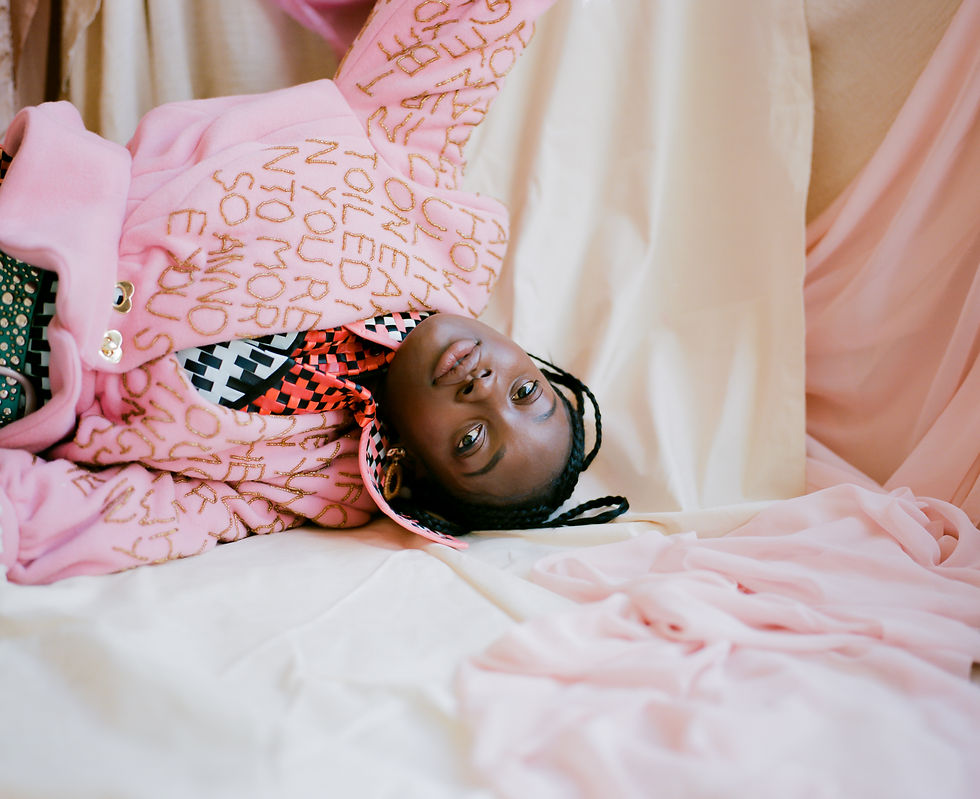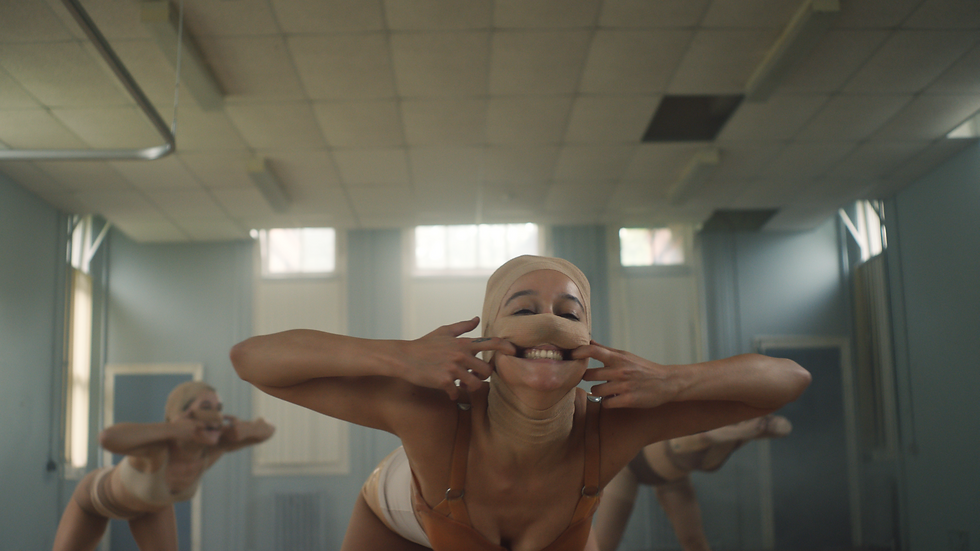The Rise of Women in Unconventional Filmmaking
- Mar 3, 2020
- 5 min read
Updated: Mar 8, 2020
Females in experimental film find an opportunity to work together

Most people are not yet familiar with this art practice: it is visually impactful, non-narrative, and it often sends a powerful message. “They describe this type of work as ‘weird’ because it is out of the ordinary,” says Ellie Gordon, an actress from the experimental film Filterface.
As for mainstream directors obsessed with narrative, it is nonsensical and hard to visualise. “In experimental film, you put something really random in to throw people off,” says Gordon. “Believe it or not, that is going to get someone’s attention.”
In Filterface, a group of girls with bandaged faces perform a hypnotising dance. It seems like they are worshipping each other for carrying a scary look. The bandage hides the famous puppy filter from Snapchat.
Released in October last year, the movie was directed by Will Cottam and Carly Randall. The inspiration came from Snapchat dysmorphia, a disorder that has come to life in recent years as social media consumption has increased. It is described as being addicted to the filtered version of yourself. The real-life couple and work duo Will & Carly thought this was culturally relevant as it is specially harming young girls. “These apps are doing what a plastic surgeon can do,” says Cottam.
“Users get addicted to it because they see themselves looking sexy and that in the end makes them hate their real selves.”
This negative impact on teenage girls is mainly being caused by female influencers for creating a feminine beauty ideal. “There should be censorship on celebrities,” says Cottam. “The laws for a fashion brand should be similarly applied, for example, on the Kardashians.”
When the puppy filter went viral, girls would post selfies and get more likes for those photos rather than the ones in which they had their real face. “It is all about getting validation and appreciation,” says Carly. “So, where do you draw a line between fantasy and reality?”
The film was shot in an abandoned mental health institution. “We got there at five in the morning, the lights weren’t working, the windows were smashed, and it was all really creepy,” says Gordon.. “I think all of this was necessary in order to fulfil the character we were trying to portray.”

However, even though it is breaking down cultural barriers, experimental film has faced challenges that have prevented it from progressing.
The Arts Council of England introduced in 2017 funding cuts which affected London-based commissioning agencies such as onedotzero and Animate projects. These were key for the development and production of experimental projects as they would help filmmakers by offering them funding and general support. “This is why rather than turning into experimental film, people are drawing from it to create their day to day work,” says Nikola Vasakova, founder of GIF, an online platform that gives visibility to women filmmakers.
GIF (Girls In Film) is an international community that stemmed from the UK, specifically London. It all first started as irregular and informal events through which Vasakova would link her friends in order to create film collaborations. But that changed when one day 200 tickets were sold for one of their events. From that point onwards, she decided to create a space where she could do more of that on a bigger scale. “Having the support network behind you makes you feel more confident,” she says. “I noticed a lack of that back in 2012 when I made my way through the industry as a producer.”
Nikola Vasakova has experienced sexism in the industry, but she did not build this community as a response to that. It is undeniable that women in film are still marginalised and there is a huge gender disparity in pay and representation. In the last decade, out of all the working film directors, only 13.6% were women. “But I don’t want to talk about how hard it is for us,” she says.
“I just want them to have a positive mindset by creating a self-confident workplace.”
In GIF there are sections for all types of filmmaking, including experimental film. She says: “Trying to get a commission from a broadcaster is hard for experimental filmmakers. That is why we need to support them because it is where many are finding their voice.”
That is the case of Will & Carly and also film director Olivia Lifungula, born in Congo and later relocated to Belgium to escape the Congolese Civil War. She pursued a career in international relations to make her parents happy, but film has always been her passion.
“I used to watch these white-girl-centered romantic movies when I was about 13,” she says. “I loved that soft and girly vibe.”

She applied this to her debut film At Dawn You Leave, released in September last year. The movie is about a recent heartbreak she had gone through. “I feel like black women can’t be heartbroken or vulnerable in general,” she says. “We always are portrayed as strong.”
At Dawn You Leave has a retro and hippie style. The actress’ body language expresses the feeling of falling in love and the joyfulness, but also the obsessiveness and rejection.
An instant connection with the film is established apart from being visually pleasing, the sound is all about Lifungula’s and her friends’ personal experiences in love.
In order to find the inspiration to develop the idea, she looked at different types of paintings, specifically Frida Kahlo’s work. Kahlo often painted portraits of her husband Diego Rivera who cheated on her several times. Despite that, she was obsessed with him. “That toxic relationship was what inspired me to use paint in my film,” she says.
To Lifungula, experimental film is an opportunity to be her crazy self. “I have always been very controlled in life,” she says. “And this work platform is this one place where I don’t need to be as conservative.”
While some try to run away from conservatism, others embrace it. Gordon explains how older generations have been told something for so long and only in the last few years it has suddenly changed. “I am not justifying this way of thinking, but I have realised how many of these people are in the industry,” she says. “And how hard it would be to convince all of them.”
Despite this situation, platforms like GIF are in some way enabling women to finally have a voice, and at the same time, it is bringing unconventional filmmaking like experimental film to life. In the case of Lifungula, she feels that for a black girl there is either support for black women related work or nothing at all.

“Thanks to GIF I feel like any other creative,” she says. Also, it has helped to make her first ever film successful. “GIF made it so much easier,” she says. “I have made contacts that can take my current and upcoming work to another level.”
The all-time solution is to work in whatever their passion is, because as Ellie Gordon says: “That is how we are going to move forward and that is how we should all go about it.”
Cover photo credits: Will & Carly
Simi is our Editor and writer, follow her on Twitter.
Comments